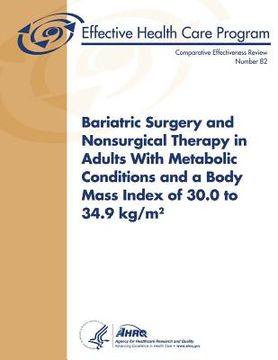Bariatric Surgery and Nonsurgical Therapy in Adults With Metabolic Conditions and a Body Mass Index of 30.0 to 34.9 kg/m²: Comparative Effectiveness R (en Inglés)
Reseña del libro "Bariatric Surgery and Nonsurgical Therapy in Adults With Metabolic Conditions and a Body Mass Index of 30.0 to 34.9 kg/m²: Comparative Effectiveness R (en Inglés)"
Bariatric surgery, also known as weight-loss surgery, refers to surgical procedures usually performed on people who are morbidly obese for the purpose of losing weight and to treat, as well as prevent, obesity-related comorbidities. Bariatric surgery has evolved since its introduction in the 1950s, with some procedures that were popular initially (like jejunoileal bypass) having been abandoned because of unacceptable complication rates. The types of bariatric surgery that are most commonly performed now include laparoscopic adjustable gastric banding (LAGB); Roux-en-Y gastric bypass (RYGB); biliopancreatic diversion with duodenal switch (BPD); and sleeve gastrectomy (SG), also referred to as gastric sleeve. Newer procedures-gastric sleeve with ileal interposition, duodenal-jejunal bypass, and duodenal-jejunal exclusion-are being studied outside of the United States (one study in the United States was conducted in 2008, but the results were not published). The mechanism of weight loss and metabolic impact are under investigation, but they are not regularly performed in the United States currently. Thus, they are beyond the scope of this report. Studies show that these procedures cause significant weight loss in morbidly obese patients. In addition, bariatric surgeries such as LAGB and RYGB in morbidly obese patients have been found to be far more effective than conventional nonsurgical therapy at lowering blood sugar to improve diabetes in the short term. Improvement in diabetes has been demonstrated to start rapidly after bariatric surgery, especially for patients undergoing RYGB, before significant weight loss has occurred. The mechanism of postoperative metabolic improvements has not been fully elucidated and may in part be independent from weight loss, suggesting that bariatric surgery may improve metabolic comorbidities, even for patients who are not morbidly obese. This systematic review aims to address the following Key Questions (KQs). KQ1. What does the evidence show regarding the comparative effectiveness of bariatric surgery for treating adult patients with a BMI of 30.0 to 34.9 kg/m and metabolic conditions, including diabetes? Are certain surgical procedures more effective than others (LAGB, RYGB, or SG)? KQ2. What does the evidence show regarding the comparative effectiveness of bariatric surgery versus conventional nonsurgical therapies for treating adult patients with a BMI of 30.0 to 34.9 kg/m and metabolic conditions? KQ3. What are the potential short-term adverse effects and/or complications associated with bariatric surgery for treating adult patients with a BMI of 30.0 to 34.9 kg/m who have metabolic conditions? KQ4. Does the evidence show racial and demographic disparities with regard to potential benefits and harms associated with bariatric surgery for treating adult patients with a BMI of 30.0 to 34.9 kg/m and metabolic conditions? What other patient factors (social support, counseling, preoperative weight loss, compliance with recommended treatment) are related to successful outcomes? KQ5. What does the evidence show regarding long-term benefits and harms of bariatric surgery for treating adult patients with a BMI of 30.0 to 34.9 kg/m and who have metabolic conditions? How do the long-term benefits and harms of bariatric surgery compare to short-term outcomes (within 1 year after surgery)?

